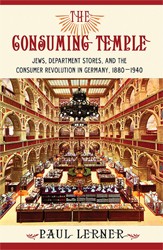The revival of Jewish life in Germany may perhaps be one of the most remarkable occurrences in the post-World-War-II Jewish world — outside of the founding of Israel. The Jewish population in contemporary Germany is the third largest in Europe and, fed by post-Soviet immigration, one of the fastest growing Jewish populations in the world. It has not been an unmixed blessing. Yascha Mounk uses his experiences growing up in Germany to provide a unique insider’s look at the often fraught status of the Jews who live there. Despite employing a memoir-like title, Mounk provides less of a family memoir than a provocative account of the changing nature of the position of the Jews: both the remainders of the Holocaust who managed to survive and decided to remain in Germany and those who have, especially since the reunification of Germany, migrated there.
Born in 1982, the son of an émigré woman from Poland who migrated with her parents in 1969 after they were allowed to leave following the purge of Jews from positions in the Communist apparatus, Mounk grew up in various small cities in Germany. There, the young Yascha was subjected to a variety of treatment, from blatant Jew-baiting by fellow students to — what for him is the more insidious behavior — the often-awkward philo-Semitism that many Germans adopted in the 1980s, and, in more recent years, the more veiled forms of anti-Semitism (including anti-Israel agitation) expressing a desire of many Germans to put an end to Holocaust guilt— described somewhat awkwardly as “putting a finish line” under the past.
For Mounk, the shifting attitude of the larger German population toward post-war and post-unification Jews reflects the struggle of the populace with the legacy of the Holocaust. This struggle played itself out in treating Jews as if they weren’t there, smothering them with a philo-Semitic embrace, and wishing they would fade into the background or worse: expressing alternatively feelings of denial, acceptance, and finally impatience with the legacy of the past. The cumulative effect of his experience, Mounk relates, was to make him feel an alien in the country of his birth. No matter that he was born in Germany and spoke German as his native language, he never felt that he was regarded by his German peers and elders as truly German.
Now a Ph.D. candidate in political thought at Harvard, Mounk has worked as a political journalist, blogger, and editor, and writes with self-assurance and command of the historical record. He quotes amply from contemporary German media and literature to substantiate his analysis. The final irony for him is that although born to a Jewish mother (he says little about his father), he was raised without much connection to a Jewish heritage but nonetheless was reminded in Germany of his identity at every turn. It is only in New York, the city with the largest Jewish population, that he can actually escape from that identity. Mounk’s account, one of the first on this subject addressed to a general English-speaking readership, is an intriguing and sometimes disturbing glimpse into an aspect of Jewish life of which most American Jews may not be aware. Notes.





